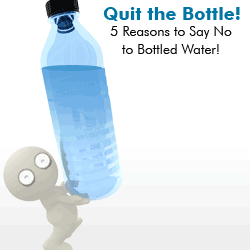
First, Coca-Cola's new brand of "pure" bottled water, Dasani, was revealed to be tap water taken from the mains. Then it emerged that what the firm described as its "highly sophisticated purification process", based on Nasa spacecraft technology, was in fact reverse osmosis used in many modest domestic water purification units.
The entire UK supply of Dasani has pulled off the shelves because it has been contaminated with bromate, a cancer-causing chemical.
It goes something like this: take Thames Water from the tap in your factory in Sidcup, Kent; put it through a purification process, call it "pure" and give it a mark-up from 0.03p to 95p per half a liter; in the process, add a batch of calcium chloride, containing bromide, for "taste profile"; then pump ozone through it, oxidizing the bromide - which is not a problem - into bromate - which is. Finally, dispatch to the shop's bottles of water containing up to twice the legal limit for bromate (10 micrograms per liter).
Bromide is a naturally occurring trace chemical that has a sedative effect. It is said to have been added by the British army to soldiers' tea during WWII to dampen down their lust. But when it is oxidized into bromate it becomes "a pretty nasty carcinogen", according to David Drury, one of the principal inspectors for the DWI.
"I've checked Thames water's supply this morning and it is free of bromate," he said. The legal limits are set to have a wide margin of safety, and the Food Standards Agency's advice yesterday was that while Dasani contained illegal levels of bromate, it did not present an immediate risk to the public.
"Any increased cancer risk is likely to be small. However, the levels are higher than legally permitted in the UK and present an unnecessary risk. Some consumers may choose not to drink any Dasani they purchased prior to its withdrawal given the levels of bromate in it," the FSA said.
Coca-Cola said it was voluntarily withdrawing all Dasani "to ensure that only products of the highest quality care provided to our consumers".
Felicity Lawrence, consumer affairs correspondent
The Guardian. March 20, 2004



